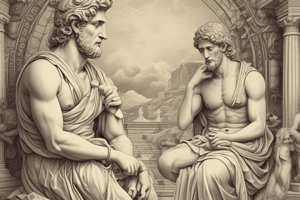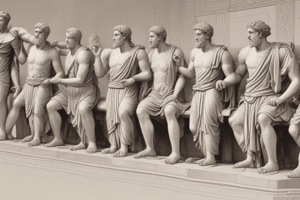Podcast
Questions and Answers
- Plato believed that understanding the world and the self was necessary for the ______ to flourish.
- Plato believed that understanding the world and the self was necessary for the ______ to flourish.
soul
- The aim of theoretical sciences is ______, while the end goal of practical ones is the good.
- The aim of theoretical sciences is ______, while the end goal of practical ones is the good.
truth
- Aristotle believed that every attempt to know is connected to the pursuit of ______ flourishing.
- Aristotle believed that every attempt to know is connected to the pursuit of ______ flourishing.
human
- While Plato believed in two realities, Aristotle believed that reality is only what the ______ can perceive.
- While Plato believed in two realities, Aristotle believed that reality is only what the ______ can perceive.
- Change is inherent in things and every entity, including human beings, moves from ______ to actualities.
- Change is inherent in things and every entity, including human beings, moves from ______ to actualities.
- Every human person aspires for an end, which for Aristotle is happiness or ______ flourishing.
- Every human person aspires for an end, which for Aristotle is happiness or ______ flourishing.
- John Stuart Mill declared the Greatest Happiness Principle in the 18th century, which states that an action is right if it maximizes the attainment of ______ for the greatest number of people.
- John Stuart Mill declared the Greatest Happiness Principle in the 18th century, which states that an action is right if it maximizes the attainment of ______ for the greatest number of people.
According to Aristotle, what is the difference between theoretical and practical sciences?
According to Aristotle, what is the difference between theoretical and practical sciences?
What did Aristotle believe about every attempt to know?
What did Aristotle believe about every attempt to know?
What was Aristotle's view on the end goal of life?
What was Aristotle's view on the end goal of life?
What was the difference between Aristotle's and Plato's view on reality?
What was the difference between Aristotle's and Plato's view on reality?
What did John Stuart Mill declare as the Greatest Happiness Principle?
What did John Stuart Mill declare as the Greatest Happiness Principle?
What was Mill's view on individual happiness?
What was Mill's view on individual happiness?
What do different schools of thought aim for?
What do different schools of thought aim for?
According to Aristotle, what is the difference between theoretical and practical sciences?
According to Aristotle, what is the difference between theoretical and practical sciences?
What did Aristotle believe about every attempt to know?
What did Aristotle believe about every attempt to know?
What was Aristotle's view on the end goal of life?
What was Aristotle's view on the end goal of life?
What was the difference between Aristotle's and Plato's view on reality?
What was the difference between Aristotle's and Plato's view on reality?
What did John Stuart Mill declare as the Greatest Happiness Principle?
What did John Stuart Mill declare as the Greatest Happiness Principle?
What was Mill's view on individual happiness?
What was Mill's view on individual happiness?
What do different schools of thought aim for?
What do different schools of thought aim for?
Aristotle believed that knowledge of the external world is not connected to knowledge of oneself.
Aristotle believed that knowledge of the external world is not connected to knowledge of oneself.
Plato believed that the world we perceive through our senses is the only reality.
Plato believed that the world we perceive through our senses is the only reality.
Aristotle was the first philosopher to approach reality from a scientific perspective.
Aristotle was the first philosopher to approach reality from a scientific perspective.
Aristotle believed that every human being aspires for an end, which is not happiness or human flourishing.
Aristotle believed that every human being aspires for an end, which is not happiness or human flourishing.
John Stuart Mill declared the Greatest Happiness Principle, which states that an action is right if it maximizes happiness for the greatest number of people.
John Stuart Mill declared the Greatest Happiness Principle, which states that an action is right if it maximizes happiness for the greatest number of people.
Mill believed that individual happiness should not be endorsed.
Mill believed that individual happiness should not be endorsed.
All schools of thought in history aim for the good and happy life.
All schools of thought in history aim for the good and happy life.
What is the difference between theoretical and practical sciences according to Aristotle?
What is the difference between theoretical and practical sciences according to Aristotle?
What did Aristotle believe was necessary to achieve human flourishing?
What did Aristotle believe was necessary to achieve human flourishing?
What did Aristotle believe was the end goal of life?
What did Aristotle believe was the end goal of life?
What was Aristotle's view on the reality of the world we perceive through our senses?
What was Aristotle's view on the reality of the world we perceive through our senses?
What did John Stuart Mill declare as the Greatest Happiness Principle?
What did John Stuart Mill declare as the Greatest Happiness Principle?
What was Mill's view on individual happiness and ethics?
What was Mill's view on individual happiness and ethics?
What is the aim of different schools of thought according to the text?
What is the aim of different schools of thought according to the text?
Flashcards are hidden until you start studying
Study Notes
The Pursuit of a Good Life: Understanding Reality and Happiness through Philosophy
- In Ancient Greece, understanding reality and the self was connected to the pursuit of a good life.
- Plato believed that understanding the world and the self was necessary for the soul to flourish.
- Aristotle made a distinction between theoretical and practical sciences, with ethics and politics falling under the latter.
- The aim of theoretical sciences is truth, while the end goal of practical ones is the good.
- Aristotle believed that every attempt to know is connected to the pursuit of human flourishing.
- Aristotle was the first philosopher to approach the problem of reality from a scientific lens and also dabbled in the problematization of happiness as the end goal of life.
- While Plato believed in two realities (the world of forms and the world of matter), Aristotle believed that reality is only what the senses can perceive.
- Change is inherent in things and every entity, including human beings, moves from potentialities to actualities.
- Every human person aspires for an end, which for Aristotle is happiness or human flourishing.
- Happiness, in this context, means a kind of contentment in knowing that one has maxed out their potential in the world and attained the crux of their humanity.
- John Stuart Mill declared the Greatest Happiness Principle in the 18th century, which states that an action is right if it maximizes the attainment of happiness for the greatest number of people.
- Different schools of thought throughout history aim for the good and happy life.
Understanding the Good Life in Ancient Greek Philosophy
- Ancient Greek philosophy sought to understand both the world and the self, believing that knowledge of the external world is connected to knowledge of oneself.
- Aristotle distinguished between theoretical and practical sciences, with the former seeking truth and the latter seeking the good.
- Aristotle believed that every attempt to know is connected to human flourishing, and that understanding the good is necessary to achieve it.
- Aristotle was the first philosopher to approach reality from a scientific perspective and also tackled the complex problem of the end goal of life: happiness.
- Unlike Plato, Aristotle believed that the world we perceive through our senses is the only reality.
- Plato believed in two realities, the world of forms and the world of matter, to explain the seemingly contrasting manifestations of change and permanence in reality.
- Aristotle believed that change is inherent in things and can only be understood through observation of the external world.
- Aristotle believed that every human being aspires for an end, which is happiness or human flourishing.
- For Aristotle, happiness is not just everyday happiness but a contentment in knowing one has achieved their potential and attained the crux of their humanity.
- John Stuart Mill declared the Greatest Happiness Principle, which states that an action is right if it maximizes happiness for the greatest number of people.
- Mill believed that individual happiness should be endorsed and that actions benefiting the greatest number of people are ethical and lead to the good and happy life.
- History has given birth to different schools of thought, all of which aim for the good and happy life.
Studying That Suits You
Use AI to generate personalized quizzes and flashcards to suit your learning preferences.




